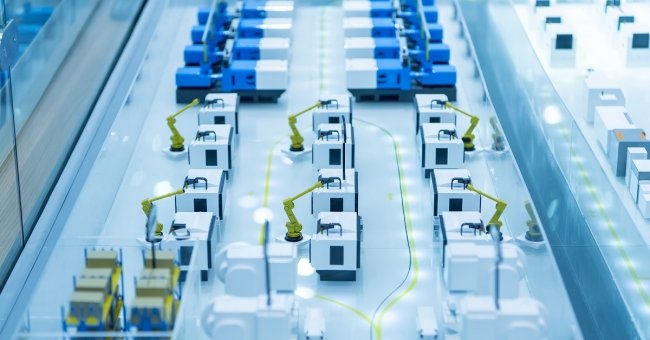The real challenge for manufacturers in this new trend of manufacturing is that neither the traditional ‘Push’ nor ‘Pull’ theories of production planning and scheduling work in an Industry 4.0 environment. What’s even a bigger problem is that the traditional MES and their scheduling and optimizing algorithms also fail to accommodate the requirements of individualized production runs, as they are fully geared and configured to support either push or pull type production.
The solution in this case, as in most cases where Industry 4.0 is concerned is the MES, where the routing for the single lot size production in the most optimized manner happens with the implementation of a decentralized marketplace on the shop floor itself. The decentralization is only logical and the configuration of the shop floor need not be modified, rather the way in which product is routed through the floor changes.
The concept of shop floor operating as a decentralized marketplace is critical to the implementation of Industry 4.0 and yet it is the most misunderstood.
CPS AND CPPS EMPOWERED TO AUTONOMOUSLY MAKE DECISIONS
First, it is vital to realize that modern material, which would be processed through the shop floor, now come equipped with the capability of understanding their environment and communicating within this environment through their connectivity over the internet with IT applications and other entities of the cyber physical system. Smart material and pallets form a CPS which essentially communicates with shop floor equipment through the MES, and the MES then provides a logical connect to the shop-floor based CPPS and/or the equipment.
Once the material enters the shop floor, it communicates to the MES the recipe to be executed and the process steps to be followed for it to become a final product. The MES then allows for process equipment to bid for performing the operation. This virtual bidding allows the CPS to choose the CPPS based on best bid in terms of process readiness, last lot produced, available machine time and other similar metrics.
Once a decision is made the material is subsequently processed and it moves onto the next stage of production, where a similar bidding takes place. The MES here acts as a logical facilitator and an orchestrator, which allows for material to take the best possible route throughout the shop floor, from the first operation to the last.
MES MUST BE PREPARED TO MANAGE THE FLOOD OF CPS AND CPPS DATA
The MES supports the traditional functions of recording and reporting lot genealogy, only the recording changes from fixed path to dynamic, thereby requiring the MES to be smart as well and accommodate these requirements through its architecture.
The role of the MES however, is much larger in the digital marketplace scenario, where real time decision making is automated on the shop floor, and the orchestration of the operation is a mix of the traditional dispatching and modern dynamic routing.
The concept of decentralized shop floor marketplace elevates the humans in the process to the role of monitoring and improving the production process, rather than operating equipment and scheduling the production runs. This adds dual value to the operation, as routing of jobs is logic based, the best route is chosen automatically, optimizing throughput and allowing for highest possible machine utilization.

